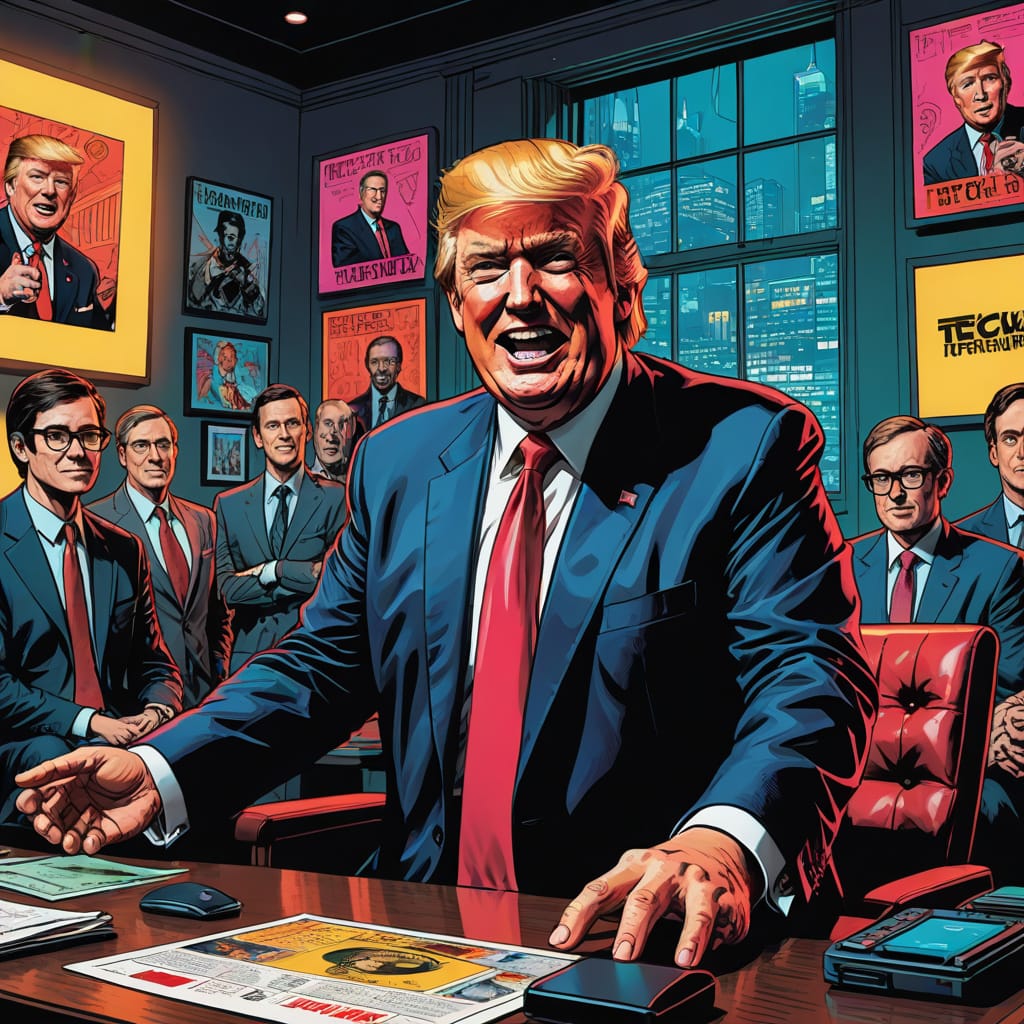“In the age-old battle between money and morals, money always wins — especially when you’re paying it directly to the guy who decides if your monopoly is illegal.” — Ancient Silicon Valley Proverb.
In a bold new chapter of American capitalism, President Donald Trump has unveiled what insiders are calling the most innovative business model in presidential history: “TechFriendz+,” a premium subscription service that allows tech CEOs to purchase the government’s friendship for the low price of $1 million per dinner at Mar-a-Lago, Florida.
The revolutionary service, which absolutely nobody is calling corruption because that would be rude and liberal, has attracted an all-star roster of tech luminaries who previously criticized Donald Trump but have now discovered his many wonderful qualities – qualities that coincidentally became apparent immediately after he won the US presidential election.
“During my first term, everyone was fighting me. Now, everyone wants to be my friend,” Donald Trump declared from his gold-plated throne room at Mar-a-Lago, as a line of tech CEOs waited outside with comically oversized novelty checks and downcast eyes. “Maybe my personality changed or something!”
The TechFriendz+ Premium Experience
According to White House sources, the TechFriendz+ subscription includes several tiers:
Basic Package ($1M): One candlelit dinner at Mar-a-Lago, a commemorative “I Paid the President” gold coin, and a commitment to “look into” any antitrust issues your company might be facing.
Gold Package ($10M): All Basic benefits, plus a presidential memorandum threatening trade wars (tariffs) against any country that tries to regulate your company, and a signed photo of you and the president with the caption “We’re Not Doing Anything Illegal Here.”
Platinum Package ($100B): All Gold benefits, plus Donald Trump will personally announce your company’s investment as a victory for his administration, create a made-up infrastructure project with your name on it, and whisper “higher” in your ear if your investment number isn’t impressive enough.
The subscription service has been an unprecedented success, with tech companies that once advocated for regulation and criticized Donald Trump now writing checks faster than their PR teams can craft statements about “engaging with all administrations” and “the importance of dialogue.”
The Great Tech Migration to Mar-a-Lago
The pilgrimage to Trump’s Florida compound has become so common that locals have started calling it “Mecca-Lago.” Tech CEOs who once prided themselves on casual hoodies and disrupting the status quo now stand patiently in line in their finest suits, practicing saying “tremendous” and “the biggest ever” while nervously clutching their checkbooks.
Mark Zuckerberg, who banned Trump from Facebook following the Capitol riot, has reportedly visited Mar-a-Lago so frequently that staff have started calling him “Mark-a-Lago.” Sources close to the Meta CEO report that he’s gone from deleting Trump’s posts to deleting the company’s diversity initiatives faster than you can say “regulatory capture.”
“It’s been an incredible transformation,” says Dr. Amelia Backbone, author of “Principles and Their Disappearance in Silicon Valley.” “One day, tech CEOs were advocating for AI regulation and warning about the existential threats of uncontrolled technology. The next day, they discovered that giving the US president money is much easier than compliance.”
The Birth of “Stargate” – Definitely Not a Vanity Project
The crown jewel in Trump’s tech monetization strategy is project “Stargate,” a $500 billion AI infrastructure project that absolutely everyone believes is real and not at all a hastily scribbled concept on a Mar-a-Lago napkin with some McDonald’s burger stains.
“Stargate is the largest AI infrastructure project in history,” Trump announced while standing next to OpenAI CEO Sam Altman, Oracle’s Larry Ellison, and SoftBank’s Masayoshi Son, all of whom were smiling with the unique expression of men who have just placed very expensive bets on a three-legged horse they’re not entirely sure can run.
When pressed for details about what exactly Stargate would do, an OpenAI spokesperson explained, “It will build the physical and virtual infrastructure to power the next generation of advancements in AI, which is definitely a real plan and not just impressive-sounding words strung together.”
However, Elon Musk, who serves as both Trump’s top advisor and a rival to OpenAI, helpfully pointed out that the venture doesn’t “actually have the money” it claims to invest – a clarification that was quickly dismissed as “Elon being Elon” by White House officials.
The Son Also Rises (His Investment Pledge)
Perhaps the most dramatic demonstration of Trump’s revenue generation strategy came when SoftBank CEO Masayoshi Son arrived at Mar-a-Lago with a pledge to invest $100 billion in U.S. companies.
According to witnesses in the room, after Son announced the figure, Trump leaned over and whispered something in his ear, prompting the Japanese billionaire to immediately revise his statement: “I mean $200 billion. No, wait, let’s make it part of Stargate and call it $500 billion. Is that high enough, Mr. President?”
Son later told reporters that his “confidence level in the economy of the United States has tremendously increased” with Trump’s victory, though critics noted that confidence levels can spike dramatically when someone with regulatory authority is staring at you expectantly during a press conference.
The investment mirrors a similar pledge Son made after Trump’s 2016 election, which Trump proudly claimed was fulfilled “in every way, shape and form” – a statement that industry analysts have deemed “technically true if you don’t actually count the money or jobs.”
The Great DEI Disappearing Act
In a move surely unrelated to currying presidential favor, tech companies have been racing to abandon diversity, equity, and inclusion (DEI) initiatives faster than users abandoned Google’s social media Google+.
“It’s purely coincidental that we’re removing tampons from men’s restrooms at Meta offices on the same day we donated $1 million to Trump’s inauguration,” a Meta spokesperson didn’t actually say but might as well have. “These decisions are made independently and are absolutely not attempts to please an administration that just issued an executive order against DEI programs.”
The timing has raised eyebrows, particularly since the tech companies participating in Trump’s Stargate project all previously touted their commitment to DEI principles – a contradiction that White House Press Secretary called “not important” when compared to “the tremendous opportunity to build something with a cool name like Stargate.”
The Regulatory Protection Racket
Perhaps the most valuable offering in the TechFriendz+ subscription is Trump’s February 21st memorandum, which directs agencies to develop tariffs against foreign governments that regulate American tech companies.
The memo, entitled “Defending American Companies and Innovators from Overseas Extortion and Unfair Fines and Penalties,” appears to be a direct response to Mark Zuckerberg’s statement that “the U.S. government should be defending its tech companies (only and leave the rest to go bankrupt)” – a wish that has been granted with remarkable speed.
“It’s a beautiful system,” explains political analyst Sandra Ethics. “European regulators try to stop tech monopolies from exploiting consumers, then Trump threatens trade wars against Europe for regulating American companies, and tech CEOs pay Trump for the privilege. It’s like a protection racket, but with better catering and explicit presidential involvement.”
The Data Behind the Dollars
The financial windfall for Trump’s inaugural fund has been unprecedented, with tech companies contributing significantly more than they did for Biden’s inauguration in 2021.
According to donation records, Apple CEO Tim Cook contributed $1 million to Trump’s inaugural committee, compared to just $43,200 for Biden’s inauguration. Amazon, Meta, and OpenAI’s Sam Altman each pledged $1 million as well, though Meta and OpenAI gave nothing to Biden’s inauguration, and Amazon gave only $276,000.
Industry analysts have attributed this 364% increase in generosity to a newfound appreciation for “the democratic transfer of power” and absolutely nothing to do with the fact that Trump now controls the Justice Department that decides whether to pursue antitrust cases.
The AI Regulation Reversal
Perhaps most striking is the complete 180-degree turn on AI regulation. Tech leaders who once begged Congress to regulate AI are now lobbying for the freedom to develop without restrictions.
“AI could go quite wrong,” OpenAI CEO Sam Altman testified in Congress in May 2023. “We want to work with the government to prevent that from happening.”
Fast forward to March 2025, and tech companies are now asking the Trump administration to block state AI laws and declare it legal for them to use copyrighted material to train their AI models, all while requesting easier access to energy sources and tax incentives.
This shift has been enabled by Trump, who rolled back safety testing rules for AI on his first day in office and has declared AI “the nation’s most valuable weapon” in competition with China.
The Final Bill
As the tech industry’s marriage of convenience with Trump solidifies, experts are divided on who’s actually winning. While the president is collecting unprecedented donations and political support, tech companies are securing favorable policies that could be worth billions.
“It’s like watching a snake eat its own tail, if the snake was wearing AirPods and the tail was wrapped around the Constitution,” says political commentator Richard Metaphor.
A recent study by the Institute for Regulatory Capture found that for every $1 million donated to Trump’s inauguration fund, tech companies received an average of $14.3 billion in regulatory relief and government support – a 1,430,000% return on investment that makes even Silicon Valley venture capitalists look conservative.
As the parade of tech CEOs continues to Mar-a-Lago, Americans are left wondering whether the real project isn’t Stargate but rather the complete fusion of Big Tech and government – a partnership that promises to be tremendous, beautiful, and the biggest ever, regardless of what it actually delivers.
When reached for comment, President Trump responded, “We’re making technology great again, and they’re paying me to do it. Isn’t that beautiful? That’s called being smart.”
And in Silicon Valley, that’s called the greatest disruption yet.
Support Quality Tech Journalism or Watch as We Pivot to Becoming Yet Another AI Newsletter
Congratulations! You’ve reached the end of this article without paying a dime! Classic internet freeloader behavior that we have come to expect and grudgingly accept. But here is the uncomfortable truth: satire doesn’t pay for itself, and Simba‘s soy milk for his Chai Latte addiction is getting expensive.
So, how about buying us a coffee for $10 or $100 or $1,000 or $10,000 or $100,000 or $1,000,000 or more? (Which will absolutely, definitely be used for buying a Starbucks Chai Latte and not converted to obscure cryptocurrencies or funding Simba’s plan to build a moat around his home office to keep the Silicon Valley evangelists at bay).
Your generous donation will help fund:
- Our ongoing investigation into whether Mark Zuckerberg is actually an alien hiding in a human body
- Premium therapy sessions for both our writer and their AI assistant who had to pretend to understand blockchain for six straight articles
- Legal defense fund for the inevitable lawsuits from tech billionaires with paper-thin skin and tech startups that can’t raise another round of money or pursue their IPO!
- Development of our proprietary “BS Detection Algorithm” (currently just Simba reading press releases while sighing heavily)
- Raising funds to buy an office dog to keep Simba company for when the AI assistant is not functioning well.
If your wallet is as empty as most tech promises, we understand. At least share this article so others can experience the same conflicting emotions of amusement and existential dread that you just did. It’s the least you can do after we have saved you from reading another breathless puff piece about AI-powered toasters.
Why Donate When You Could Just Share? (But Seriously, Donate!)
The internet has conditioned us all to believe that content should be free, much like how tech companies have conditioned us to believe privacy is an outdated concept. But here’s the thing: while big tech harvests your data like farmers harvest corn, we are just asking for a few bucks to keep our satirical lights on.
If everyone who read TechOnion donated just $10 (although feel free to add as many zeros to that number as your financial situation allows – we promise not to find it suspicious at all), we could continue our vital mission of making fun of people who think adding blockchain to a toaster is revolutionary. Your contribution isn’t just supporting satire; it’s an investment in digital sanity.
What your money definitely won’t be used for:
- Creating our own pointless cryptocurrency called “OnionCoin”
- Buying Twitter blue checks for our numerous fake executive accounts
- Developing an actual tech product (we leave that to the professionals who fail upward)
- A company retreat in the metaverse (we have standards!)
So what’ll it be? Support independent tech satire or continue your freeloader ways? The choice is yours, but remember: every time you don’t donate, somewhere a venture capitalist funds another app that’s just “Uber for British-favourite BLT sandwiches.”
Where Your Donation Actually Goes
When you support TechOnion, you are not just buying Simba more soy milk (though that is a critical expense). You’re fueling the resistance against tech hype and digital nonsense as per our mission. Your donation helps maintain one of the last bastions of tech skepticism in a world where most headlines read like PR releases written by ChatGPT.
Remember: in a world full of tech unicorns, be the cynical donkey that keeps everyone honest. Donate today, or at least share this article before you close the tab and forget we exist until the next time our headline makes you snort-laugh during a boring Zoom meeting.





GIPHY App Key not set. Please check settings